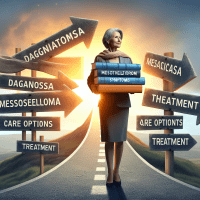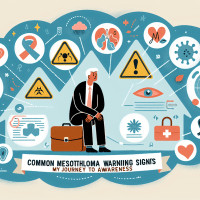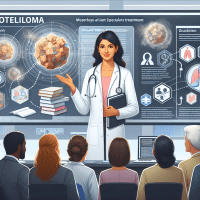Mesothelioma Insights & Early Asbestos Exposure Symptoms
Hello, I’m an oncology patient educator and advocate with years of experience supporting individuals affected by mesothelioma. Today, I want to share my personal insights and professional knowledge about mesothelioma, focusing on the early signs of asbestos exposure symptoms. My goal is to empower you with clear, actionable information while acknowledging the emotional journey many face during these challenging times.

Understanding Mesothelioma and Asbestos Exposure
Mesothelioma, a rare cancer typically linked to asbestos exposure, has impacted countless lives. I have seen firsthand how the early signs of asbestos exposure can often go unnoticed or be mistaken for less severe conditions. This delay in recognition can lead to a late diagnosis, emphasizing the need for vigilance. In my years of involvement with patient care and education, I have learned that early detection, vigilant symptom monitoring, and proactive medical consultations are key to managing this disease effectively.
It is crucial to know that asbestos exposure symptoms vary among individuals. Typical symptoms include shortness of breath, persistent cough, and chest pain. For professionals working in construction, industrial settings, or even in older buildings where asbestos was once common, these early signs may be missed until the condition has progressed. Recognizing the subtle differences in symptoms associated with asbestos-related diseases can be challenging yet essential.
Identifying Early Asbestos Exposure Symptoms
My approach is rooted in both empathy and factual accuracy. When discussing early asbestos exposure symptoms, I emphasize the importance of a comprehensive health review, especially if you have had potential exposure in your work or living environment. Common early signs include:
- Shortness of breath and difficulty with deep breathing
- Persistent dry cough or recurring respiratory infections
- Chest pain that worsens with breathing or coughing
- Unexplained weight loss and fatigue
While these symptoms can be indicative of a range of conditions, if you suspect asbestos exposure, it is crucial to consult your healthcare provider promptly.
Asbestos-Related Diseases and Complications
Beyond mesothelioma, prolonged exposure to asbestos can lead to other severe conditions such as asbestosis and lung cancer. My work often involves guiding patients through understanding these potential complications, and I stress the importance of regular asbestos testing services, especially for those exposed in high-risk environments. Whether you are a construction worker or a homeowner concerned about asbestos in old insulation, having access to thorough asbestos testing for home inspections can be life-saving.
Comprehensive Mesothelioma Treatment Options
Staying informed about treatment options is essential. Based on the latest guidelines from the National Cancer Institute (NCI) and the American Cancer Society, treatment for mesothelioma is highly personalized. My role as an advocate includes ensuring that patients are aware of all avenues available to them. These treatment options typically include:
- Surgery: Options like pleurectomy or extrapleural pneumonectomy are considered depending on the stage and location of the tumor.
- Chemotherapy: Often used to slow disease progression and improve quality of life.
- Radiation Therapy: To target and shrink tumors, alleviating pain and related symptoms.
- Emerging Therapies: Clinical trials and experimental treatments providing hope for improved outcomes.
In my honest experience, each treatment pathway involves a comprehensive discussion with your healthcare provider, ensuring that every decision is made with full transparency and compassion. I always encourage open dialogue, as every patient’s journey is unique.
For additional details on these options, please visit our internal page on Mesothelioma Treatment Options.
Navigating Emotional and Supportive Care
Living through a mesothelioma diagnosis not only affects your physical well-being but also takes an emotional toll. As someone who has stood alongside many in this journey, I urge you to seek emotional and psychological support. Experiencing a wide range of emotions is normal, and connecting with others who understand can be incredibly healing. Support can come in several forms:
- Support Groups: Local and online communities provide valuable space to share and learn from peers.
- Counseling: Professional guidance can help navigate the intense feelings experienced during treatment.
- Caregiver Programs: Specialized support for those taking care of loved ones with mesothelioma.
For those caring for someone with mesothelioma, please read more on our page dedicated to Emotional Support Resources for Mesothelioma Caregivers.
Visual Insight: Mesothelioma Staging & Treatment Diagram
Understanding the progression of mesothelioma is vital. Below is a medically accurate diagram illustrating mesothelioma staging and corresponding treatment options, based on guidelines from authoritative sources including the Mesothelioma Applied Research Foundation. This diagram is designed to provide a clear, visual roadmap, highlighting various treatment strategies at each stage of the disease.

Prevention and Awareness: Steps Moving Forward
Though mesothelioma is an aggressive disease, there are actionable steps we can all take toward prevention. Maintaining strong awareness about early asbestos exposure symptoms and the inherent risks of asbestos is the first line of defense. Here are key preventative measures:
- Safe Working Environments: Employers should adhere strictly to asbestos safety guidelines, minimizing exposure in industries where asbestos is present.
- Regular Testing: Utilize asbestos testing services to identify and manage exposure risks promptly, whether in industrial settings or residential properties.
- Public Awareness Campaigns: Inform your family, friends, and community members about the dangers of asbestos and methods of disease prevention.
Organizations such as the American Cancer Society have developed resources to help spread this awareness. I advocate for open conversations about these risks in every community, as informed individuals are our best line of defense against future tragedies.
Balanced Disclosure and Transparency Statement
I believe in full transparency and providing support before all else. It’s important to mention that while our platform may at times promote external resources and support services, including legal assistance for asbestos-related cases, our foremost commitment is to deliver accurate, compassionate, and evidence-based information. All recommendations provided here are for educational purposes and should always be followed up with professional medical consultation.
Future Perspectives and Ongoing Research
As we approach mid-2024, ongoing research continues to bring hope. Recent advances in both diagnostic tools and treatment options are on the horizon. In my personal and professional experience, I have witnessed transformative changes in the way we approach mesothelioma care—both in prevention and in treatment. The integration of cutting-edge technology, combined with compassionate patient care, is setting a new standard in oncology support. I remain committed to staying abreast of these developments, so you receive the most current and reliable information possible.
For anyone undergoing diagnosis or treatment, remember: every patient journey is individualized, and every small victory is meaningful. I am here to offer both guidance and understanding throughout your battle against this challenging disease.
Conclusion
In sharing this detailed overview of mesothelioma, early asbestos exposure symptoms, and comprehensive treatment options, my intention is to provide you with a sense of empowerment and clarity. Navigating through diagnosis, treatment, and recovery is a deeply personal journey—one that benefits from both robust medical insights and compassionate human support.
Thank you for taking the time to read this post. I encourage you to continue exploring the topic through our internal resources and the trusted research of organizations like NCI, American Cancer Society, and the Mesothelioma Applied Research Foundation. Please remember, knowledge combined with support can make all the difference in managing your health and wellbeing.






